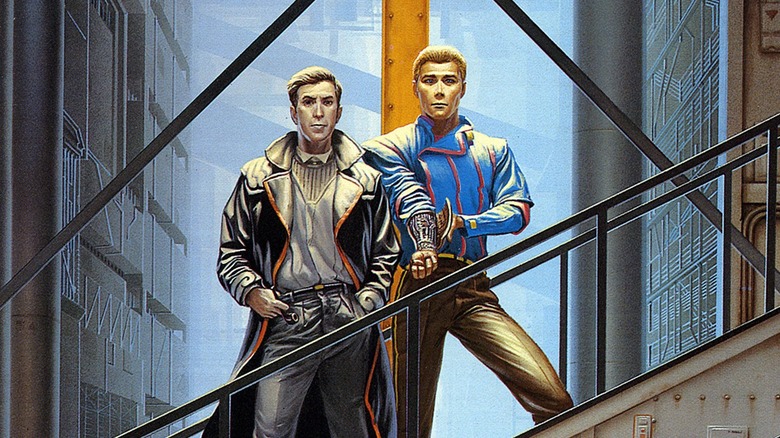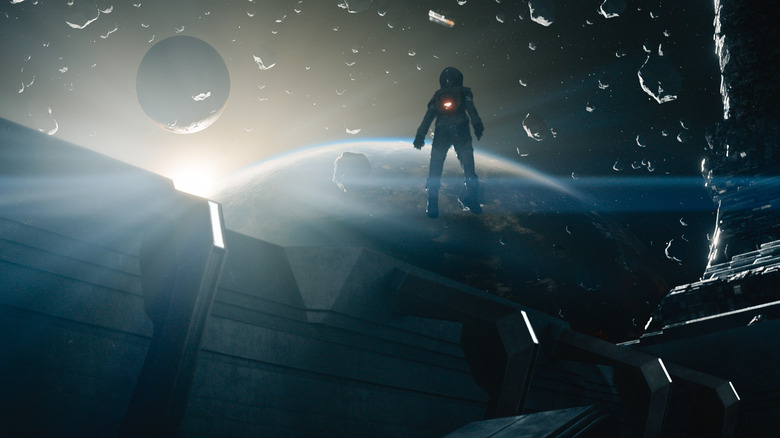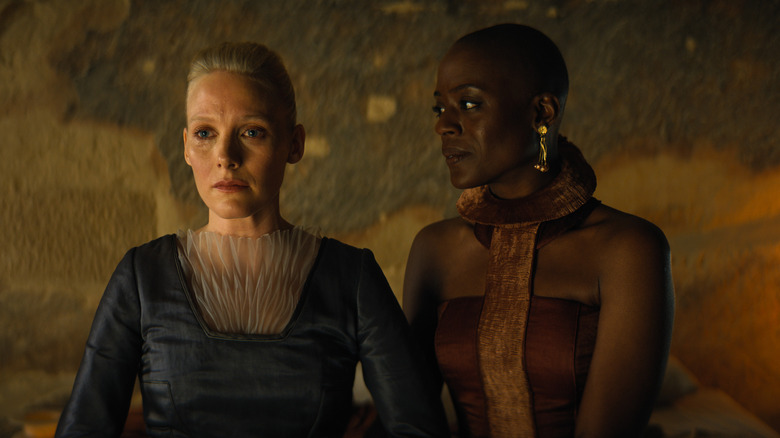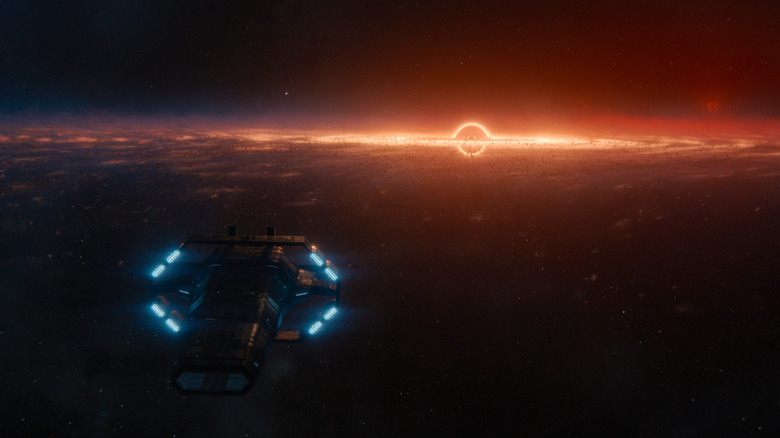Isaac Asimov's Caves Of Steel Is The Next Great Prestige Sci-Fi Series Waiting To Happen
When it comes to classic sci-fi, there are few names as famous and influential as Isaac Asimov. And when it comes to modern prestige streaming series, adaptation is the name of the game. From "The Rings of Power" and "Shadow and Bone" to "Altered Carbon" and "The Last of Us," TV has been dominated by big-budget sci-fi and fantasy adaptations for years. And with the streaming wars still raging, every platform is constantly searching for its next great source of inspiration and subscriptions.
Enter Asimov's "The Caves of Steel," a taut sci-fi murder mystery first published serially in 1953. Asimov's library of stories spans all subgenres of science fiction, featuring galactic empires, space truckers, and a standard for robot fiction that still stands today. "The Caves of Steel" takes place pretty early in the author's overarching lore, and as such, it's relatively independent. But it also has subtle, wide-reaching ramifications for Asimov's entire cosmic saga. If you're a streaming executive, that combo should be enough to make you drool.
Of course, adaptation isn't always so simple. There are countless acclaimed, beloved, or forgotten books that could become TV gold in the right hands. But that also requires the right showrunner, production team, cast, and stylistic angle. Fortunately, "The Caves of Steel" already has a leg up in some of those areas as well. Here's how Asimov's classic robo-noir could become the next great prestige sci-fi series.
What happens in Isaac Asimov's The Caves of Steel?
Set roughly around the year 5000, "The Caves of Steel" paints a grim picture of life on a dying Earth and the early days of cosmic colonization. Human settlements have been constructed on a number of other worlds known as the Spacer planets — the general moniker for all space-based folks. Meanwhile, Earth has suffered from a bloated domestic population and a lack of resources, leading to the development of massive, domed cities where most humans live — the eponymous "Caves of Steel."
The major political issue in the story is that of robots. The Spacers want to promote the use of robots to spur further space exploration and the creation of even more colonies, while many on Earth are skeptical of such reliance on sentient technology. There's even an extremist faction known as the Medievalists who despise the use of robots entirely.
In this riveting world of techno-politics and overcrowded megacities, we meet Detective Elijah Baley, who's assigned the curious murder case of a Spacer ambassador who was pushing for more robot use. In his investigation, Baley is paired up with R. Daneel Olivaw, a human-passing robot. The duo arguably became Asimov's most famous, going on a number of adventures together over several successive novels and stories.
The Caves of Steel has a perfect blend of mystery and science fiction
The format of Asimov's "The Caves of Steel" is perfect for modern streaming. It has all the larger worldbuilding and sci-fi lore you need to make a compelling universe, but the core story is still very focused. It also spans genres, incorporating elements from both traditional science fiction and pulp detective serials.
In a way, the novel can be seen as a precursor to Philip K. Dick's 1968 novel "Do Androids Dream of Electric Sheep?" Both stories take place on an Earth in decline amidst a human society that's beginning to spread out among the stars, and both hold at their core the question of robotic sentience. Dick's novel spawned arguably the most successful sci-fi adaptation of all time when Ridley Scott turned it into "Blade Runner" in 1982. By taking inspiration from that film's neo-noir stylings but embracing the classic sci-fi tone of Asimov's work, a "Caves of Steel" series could strike a perfect balance.
Foundation has already opened the door for more Asimov TV series
The main thing that "The Caves of Steel" has over other classic sci-fi novels when it comes to adaptation is that the model has already been set. Apple TV+ opened the door for more Asimov shows with its high-budget "Foundation" series, which received strong reviews overall. Season 1 is far from perfect, but it does a lot of things impressively well, and "Foundation" Season 2 is set to hit the streamer on July 14, 2023.
The main criticism against "Foundation" is that it suffers from the sheer size of its source material. Asimov's original trilogy covers thousands of years of galactic civilization and dozens of major characters. Inevitably, you're going to have some problems when trying to turn that saga into an hour-long TV drama. "The Caves of Steel," on the other hand, is tightly focused. There are no sprawling timelines or galactic empires — just a tense mystery with a lot of rich sci-fi flavor.
At the same time, a "Caves of Steel" show could benefit greatly from the preexisting mythos of the "Foundation" series. If Apple wanted to expand its Asimov offerings, the studio could easily create a cinematic universe of sorts, as the two novels take place in the same continuity. In fact, the character of R. Daneel Olivaw has a huge impact on the events of the "Foundation" stories. Saying more would get into spoiler territory, but suffice it to say that "Foundation" viewers already know more about the robot than they might think.
The Caves of Steel is more relevant now than ever
Last but not least, "The Caves of Steel" has all the thematic trappings of a modern sci-fi hit. The novel's focus on artificial intelligence, its relationship with and employment by humanity, and the environmental degradation of Earth are all, unfortunately, fiercely relevant right now. Though Asimov's book was first published 70 years ago, it's arguably more contemporary now than it's ever been. And with the aesthetic flair available thanks to today's streaming budgets, the whole story could be made powerfully modern.
On top of all that, there's plenty of material to pull from if a "Caves of Steel" show were to take off. Elijah Baley and R. Daneel Olivaw also star in Asimov's "The Naked Sun," "Mirror Image," and "The Robots of Dawn." Their relationship is arguably the most significant and emotionally impactful in all of Asimov's fiction, as it truly gets to the heart of what he believed it would mean to live in a world with robotic life.
Obviously, some of these details could be changed or tweaked as needed for a modern series adaptation, but the core would work without much alteration at all. That's the great thing about philosophically rich source material like Asimov's: It provides tons of options to pull from, but also room for growth.




